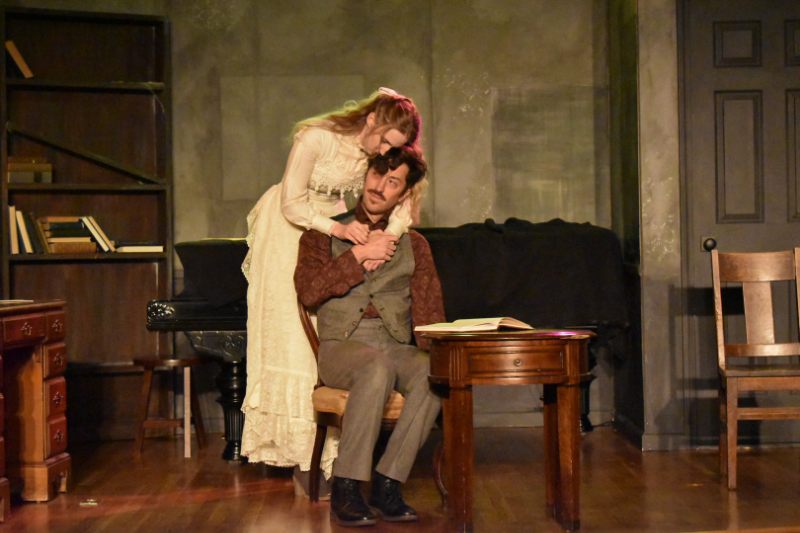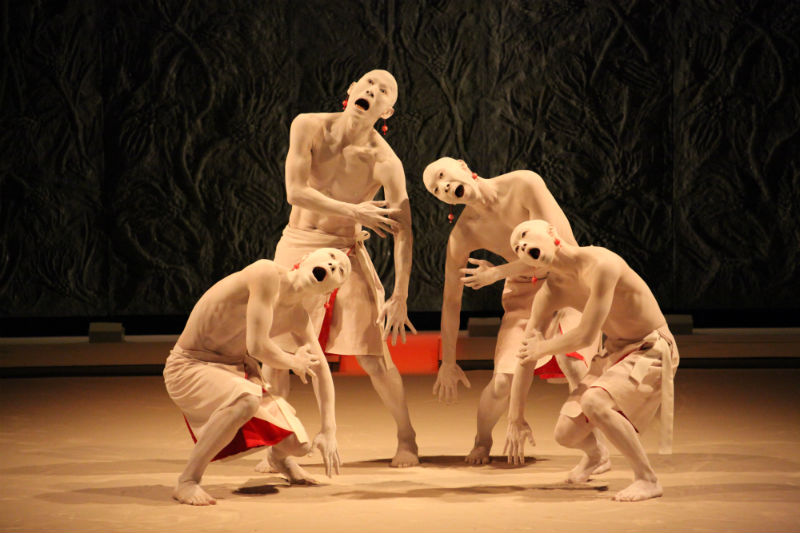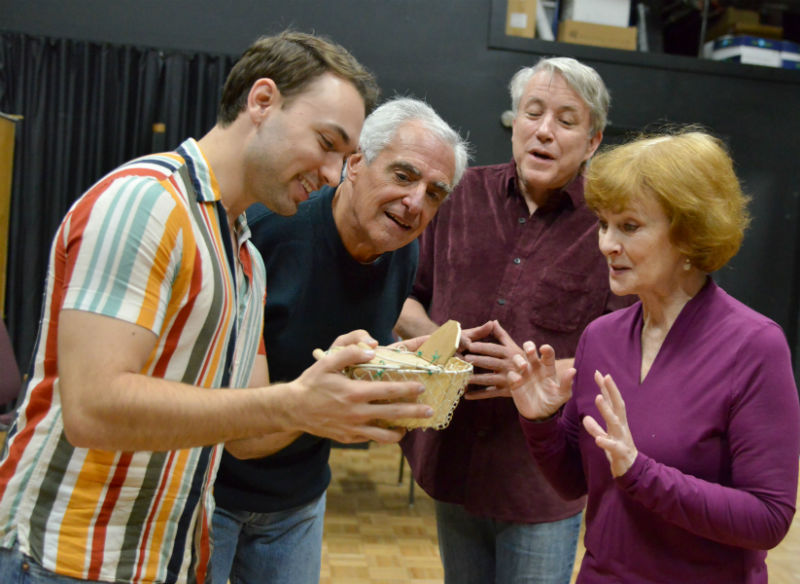U-M brings diversity to Steinbeck’s "Grapes of Wrath"

John Steinbeck’s The Grapes of Wrath is a great American classic.
It is set in a specific time, the Great Depression of the 1930s; specific places, the Dust Bowl ravaged southwest and the fertile promised land of California; and a specific group of people, the migrant Joad family of Oklahoma, one of many families looked down upon as ignorant Okies, traveling with hope for a better life. Yet the story continues to resonate as migrants make their way from Central America to the United States border and from Syria and North Africa to the shores of Europe in search of justice, peace and a chance for that better life.
The University of Michigan Department of Theatre and Drama is presenting a production of Frank Galati’s critically acclaimed stage adaptation of Steinbeck’s novel.
“It seemed timely, relevant, a great American tragedy, a great novel,” said production director Gillian Eaton, an award-winning actress, director, and U-M faculty member.
Encore Theatre ably explores "The Secret Garden" despite the play's storytelling woes

Generally, when we’re suffering and in pain, we know the cause.
But when it comes to identifying what will heal us -- let alone knowing whether healing is even possible -- that’s another matter entirely.
This all-too-human struggle makes up the core of the 1991 stage musical adaptation of The Secret Garden -- book and lyrics by Marsha Norman, music by Lucy Simon -- on stage at Dexter’s Encore Theatre.
Inspired by Frances Hodgson Burnett’s classic 1911 children’s novel, the story begins -- rather confusingly, to be honest -- with a young British girl, Mary Lennox (Jojo Engelbert), surviving a cholera epidemic that leaves her an orphan in India. She’s dispatched to the country home of her Uncle Archibald (Jay Montgomery), but he doesn’t bother to greet her, so steeped is he in his own grief for his deceased wife, Lily (Sarah B. Stevens).
Mary’s only company at first is a maid named Martha (Dawn Purcell), but then Mary befriends Martha’s nature-loving brother, Dickon (Tyler J. Messinger), who feeds Mary’s curiosity about the walled-off, locked-up secret garden that was once loved and tended by Lily. Plus, Mary soon stumbles upon another young resident of the house: sickly, bedridden Colin (Caden Martel), who fears that his father, Archibald, hates him because his birth caused Lily’s death.
If this all sounds pretty dark and gloomy, well, it is.
Theatre Nova fund-raiser showcases a stripped-down version of Sondheim’s "Follies"

Theatre Nova has chosen, appropriately, a showbiz musical as a fund-raiser for the innovative professional theater that specializes in new plays and new playwrights.
This play isn’t new nor are the writers, but the show-business environment and its emotional ups and downs are perfect for reminding theater-goers why live theater matters. Follies, with music and lyrics by Stephen Sondheim and book by James Goldman, is a tip of the hat to obsessions, from being on stage to matters of the heart.
Nova recently received a matching grant of $15,000 from the Michigan Council of Arts and Cultural Affairs and the National Endowment for the Arts. The two-weekend limited run of Follies is one of several fund-raisers to meet the match. Nova is presenting a stripped-down, concert version of the musical that puts the spotlight on the songs and keeps the focus on the central story of two former showgirls and their unhappy marriages. Actors double up on some roles and side plots are eliminated.
The story concerns a reunion of Weismann Follies showgirls (a fictional Ziegfeld). They gather together in an old Broadway theater in 1971, 30 years since they last performed just before the U.S. entry into World War II.
Joseph Zettelmaier's "Dr. Seward’s Dracula" is a creepy, clever prequel to Bram Stokers' vampire legend

Near the end of Joseph Zettelmaier’s play Dr. Seward’s Dracula -- now being staged by The Penny Seats Theatre Company, at Ann Arbor’s Stone Chalet Inn -- a character observes, “People need their monsters.”
So it seems. For it’s far more comforting and palatable to believe that humans like ourselves simply aren’t capable of committing the very worst acts of violence and depravity.
But we are, of course. And this unnerving truth is precisely what drives Zettelmaier’s unconventional take on the Dracula story.
The atmospheric dance troupe Sankai Juku transfixed the Power Center with haunting movement

There’s an image I’ve been having a hard time getting out of my head ever since the performance of Sankai Juku’s Meguri: Teeming Sea, Tranquil Land at the Power Center last weekend:
Four dancers in an eerie semi-darkness -- bald, torsos nude, bodies covered in white dust -- stand together in a circle. They stay fixed to the floor, seemingly rooted to the spot, as their bodies turn around in a unified, slow-motion gesture. Their feet rotate in place as their limbs twist together, until legs spiral around one another and the spine and neck swivel to bring the ghostly visages directly before the audience. On the faces, there is an open-mouthed image of silent, inexpressible anguish, a sort of inaudible scream whose riveting force stops your breath. For a moment, before the contorted and gnarled bodies reverse direction and rotate back, you have unshakable certainty that this is the face of a body in pain.
It’s haunting.
Then the moment passes and the spell dissipates.
There’s no pain here, not really, just illusion and mastery.
This kind of arresting image isn’t uncommon for Sankai Juku, a Paris-based troupe that practices a Japanese dance form known as butoh, an avant-garde genre that arose in the 1960s and is recognizable by its characteristic use of white body powder and shaved heads.
Michigan Made: Theatre Nova’s Playwrights Festival puts the spotlight on new works for the stage

Part two of Theatre Nova’s semi-annual Michigan Playwrights Festival has an added evening that gives more opportunities to shine the spotlight on new playwrights. In addition to staged readings of four full length plays, the festival will set aside an evening for the presentation of six 10-minute plays.
The Michigan Playwrights Festival is in its fifth season, part of Theatre Nova’s focus on new plays and playwrights. Twice a year, a committee selects four plays for presentations in staged readings. The festival will present a play each night Oct. 24-27. The Evening of 10-Minute Plays will be presented Oct. 23.
The four plays selected for the regular festival are The Lion’s Share by Catherine Zudak, Dear Camp by Lisa MacDonald, Silo Tree by Sam Collier, and Blight by R.D. Wakeman.
Playwright Sarah Elisabeth Brown is coordinating the evening of 10-minute plays for Theatre Nova.
“The evening is new to the festival and comes out of a group I started in conjunction with Theatre Nova about a year ago called the Nova Lab, which is designed as a resource to playwrights of all levels who would like to develop their craft,” Brown said in an email interview. “Our signature event is called Prompts for Playwrights and we meet on Sunday evenings when the theater is dark.”
Locked-Up With Laughter: A2 Civic Theatre’s "My Three Angels" is a sharp family comedy

When Barbara Mackey King proposed directing My Three Angels for this season at Ann Arbor Civic Theatre, she had two goals in mind. One was for actors and the other for audiences.
“I was in another play at Civic Theatre and everyone was talking about how there weren’t a lot of great plays for older actors,” she said. “I thought I can help with that and I remembered My Three Angels, which has some very fine parts for older, experienced actors.”
She was also looking for a play that would appeal to a diverse audience.
“I chose this play because it’s what I would call a good family comedy,” she said. “By that I mean not Leave It to Beaver or something like that, not for tiny kids. But something that the whole family can enjoy. It’s not too salacious or suggestive or anything like that. It’s something you can bring older kids to.”
She said that’s important for the future of live theater.
U-M’s take on Gilbert and Sullivan’s "The Pirates of Penzance" zips along in swashbuckling style

It is the very model of a modern musical comedy.
The University of Michigan Department of Music’s production of Gilbert and Sullivan’s ever-popular The Pirates of Penzance moves along faster than the celebrated major-general’s patter song. The tiny Lydia Mendelssohn stage is alive with color, movement, and music.
Director Vincent J. Cardinal has chosen the 1980 Joseph Papp New York version of Penzance with more swashbuckling, dancing and some reinterpretation of Sullivan’s music. That production starred Kevin Kline, Linda Ronstadt, and Rex Smith. U-M’s production is filled to overflowing with musical theater stars of the future.
All the Town's a Stage: Ann Arbor Civic Theatre celebrates its 90th anniversary

On Broadway in 1929, the Marx Brothers had them rolling in the aisles with Animal Crackers, Louis Armstrong was singing and playing a driving trumpet in “Hot Chocolates,” William Gillette was back for another turn at Sherlock Holmes, and Cole Porter had his first big hit with “Fifty Million Frenchmen.”
On a more serious note, Porgy by Dorothy and DuBose Heyward debuted and Eugene O’Neill Strange Interlude starring Lynn Fontanne was a big draw.
In Ann Arbor, a group with a passion for theater started a private club that began meeting to study and perform script readings. That passion is still glowing as the club that became the Ann Arbor Civic Theatre celebrates its 90th anniversary.
“That was sort of an outlet for people who wanted to get involved in theater but weren’t part of the university, because there wasn’t a community outlet at that time,” said Alexandra Berneis, Civic Theatre executive director. “They met at homes and in basements and things like that. They read plays, thinking about what they would do about creating an artistic outlet for people.”
Great Lakes Ghosts: Roustabout Theatre Troupe Haunts Ypsi With New Zettelmaier Play

Joseph Zettelmaier’s Haunted: The Great Lakes Ghost Project. which closes the Roustabout Theatre Troupe’s season at the Ypsilanti Experimental Space (YES) this month, might never have been written if the founder of another Washtenaw County theater hadn’t encouraged him to write. After studying acting at Shorter University in Georgia, he returned to his family in Michigan and secured an acting apprenticeship at the Purple Rose Theatre Company in Chelsea.
Playwriting? That wasn’t Zettelmaier’s plan.
Apprentices at the Rose often perform on nights when the theater doesn’t have public performances. Sometimes they do original pieces, so Zettelmaier tried his hand at a few pages. “The night we did it, Jeff [Daniels] came up to me and said, ‘Give me 100 pages.’ I had an interest in playwriting, but it was Jeff’s interest in my interest that got me started,” Zettelmaier recalls.


































